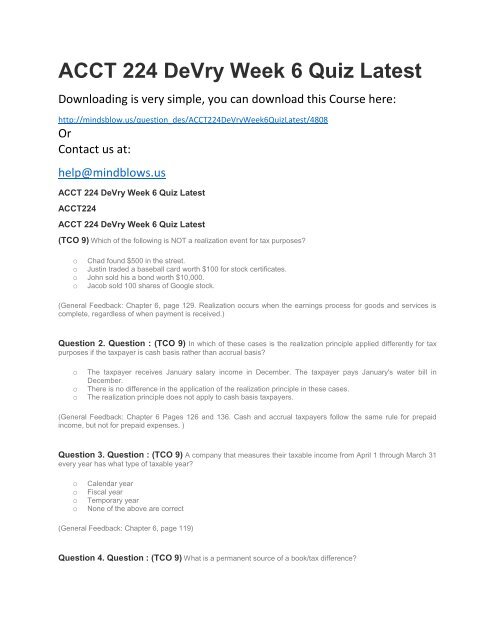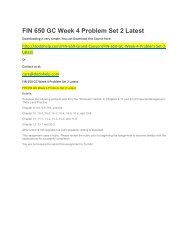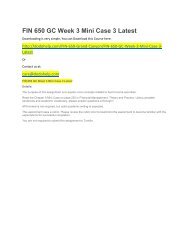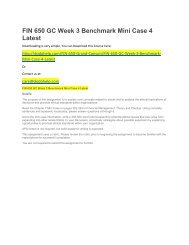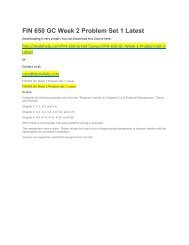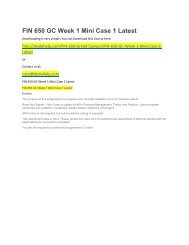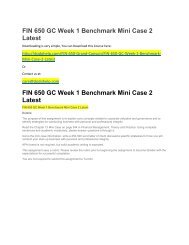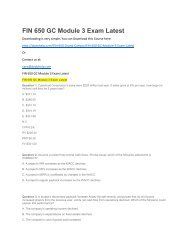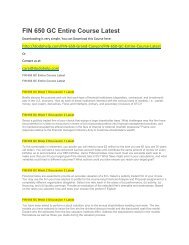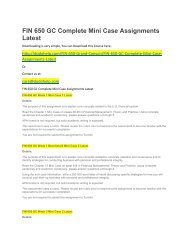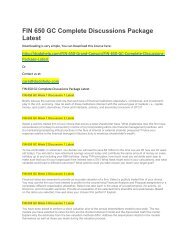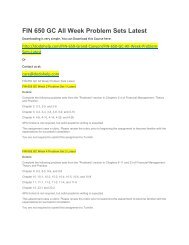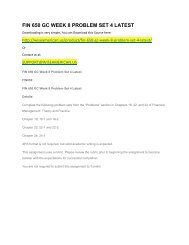ACCT 224 DeVry Week 6 Quiz Latest
You also want an ePaper? Increase the reach of your titles
YUMPU automatically turns print PDFs into web optimized ePapers that Google loves.
<strong>ACCT</strong> <strong>224</strong> <strong>DeVry</strong> <strong>Week</strong> 6 <strong>Quiz</strong> <strong>Latest</strong><br />
Downloading is very simple, you can download this Course here:<br />
http://mindsblow.us/question_des/<strong>ACCT</strong><strong>224</strong><strong>DeVry</strong><strong>Week</strong>6<strong>Quiz</strong><strong>Latest</strong>/4808<br />
Or<br />
Contact us at:<br />
help@mindblows.us<br />
<strong>ACCT</strong> <strong>224</strong> <strong>DeVry</strong> <strong>Week</strong> 6 <strong>Quiz</strong> <strong>Latest</strong><br />
<strong>ACCT</strong><strong>224</strong><br />
<strong>ACCT</strong> <strong>224</strong> <strong>DeVry</strong> <strong>Week</strong> 6 <strong>Quiz</strong> <strong>Latest</strong><br />
(TCO 9) Which of the following is NOT a realization event for tax purposes?<br />
o Chad found $500 in the street.<br />
o Justin traded a baseball card worth $100 for stock certificates.<br />
o John sold his a bond worth $10,000.<br />
o Jacob sold 100 shares of Google stock.<br />
(General Feedback: Chapter 6, page 129. Realization occurs when the earnings process for goods and services is<br />
complete, regardless of when payment is received.)<br />
Question 2. Question : (TCO 9) In which of these cases is the realization principle applied differently for tax<br />
purposes if the taxpayer is cash basis rather than accrual basis?<br />
o<br />
o<br />
o<br />
The taxpayer receives January salary income in December. The taxpayer pays January's water bill in<br />
December.<br />
There is no difference in the application of the realization principle in these cases.<br />
The realization principle does not apply to cash basis taxpayers.<br />
(General Feedback: Chapter 6 Pages 126 and 136. Cash and accrual taxpayers follow the same rule for prepaid<br />
income, but not for prepaid expenses. )<br />
Question 3. Question : (TCO 9) A company that measures their taxable income from April 1 through March 31<br />
every year has what type of taxable year?<br />
o<br />
o<br />
o<br />
o<br />
Calendar year<br />
Fiscal year<br />
Temporary year<br />
None of the above are correct<br />
(General Feedback: Chapter 6, page 119)<br />
Question 4. Question : (TCO 9) What is a permanent source of a book/tax difference?
o<br />
o<br />
o<br />
o<br />
Prepaid income<br />
Bad debts<br />
Related party accruals<br />
Interest on state and local bonds<br />
(General Feedback: Chapter 6, page 144)<br />
Question 5. Question : (TCO 9) In which of the following instance(s) is the measurement of net income for tax<br />
purposes different for accrual basis and cash basis calendar year taxpayers?<br />
o<br />
o<br />
o<br />
o<br />
In December, the taxpayer signs a contract for routine legal service to be performed in December and paid<br />
for in January of the following year.<br />
The taxpayer's equipment is repaired in November and the bill is paid in December.<br />
The measurement of net income is different in both of these cases.<br />
Net income would be the same under both cash and accrual methods.<br />
(General Feedback: Chapter 6. The concept of substantial economic performance means that the accrual basis<br />
taxpayer cannot deduct the cost until the work is performed, unless the work is routine and paid within nine months.<br />
The concept does not apply here.)


